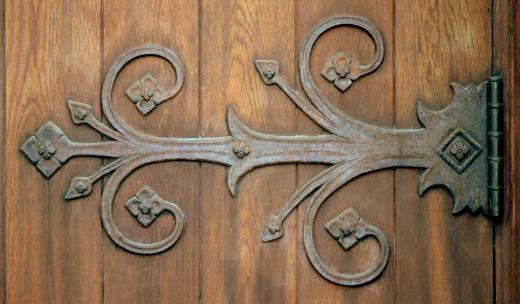A butt hinge is a hardware device used to hang and swing a door. Builders may also use these hinges to install cabinet doors or even to fasten a lid to a trunk or chest. Butt hinges are generally the simplest and most affordable hinge design available, and come in several different varieties to meet the needs of different types of projects. They come in finishes ranging from chrome to brass, and generally feature a solid steel construction. Butt hinge finishes are typically chosen to match the surrounding hardware in order to create a cohesive look.
Each butt hinge consists of two metal plates, or leaves. The edge of each plate consists of interlocking teeth, which are also referred to as knuckles. The two plates interlock at the knuckles and are joined together by a metal pin or stud, which passes through the knuckles along the entire length of the hinge. This allows the two plates to hinge away from one another to a full 180 degrees, or to close face to face like the pages of a book.

These hinges typically come equipped with pre-drilled holes designed to accommodate screws or other fasteners. Each manufacturer uses a unique screw pattern, which means that the screw locations are slightly different based on manufacturer and brand. This is designed to encourage users to stick with the same brand when replacing or repairing an existing door.
Traditional butt hinge models simply featured metal knuckles, which created a great deal of friction as doors opened or closed. On modern hinges, a ball bearing is often inserted between each knuckle to reduce friction. This not only extends the life of the hinge but allows for easier and more efficient operation.
Some applications may require specialty butt hinge designs. For example, exterior doors are often hung using security hinges, which have a non-removable pin. This means that intruders are not able to hammer out the stud or pin and remove the door to gain access. Other specialty hinges include ring butt hinge designs. The knuckles on this hinges lift and separate as the door is opened, which allows the door to open with ease while minimizing unsightly gaps beneath the door when it is closed.
A butt hinge may be recessed or surface mounted on the door and frame. In order to install a recessed hinge, builders must first mortise out a hollow on the edge of the door and frame. This can be done using a hammer and chisel, or with the aid of a special template and mechanical wood router. Surface mounted hinges do not require this recess, and are typically easier to install.
